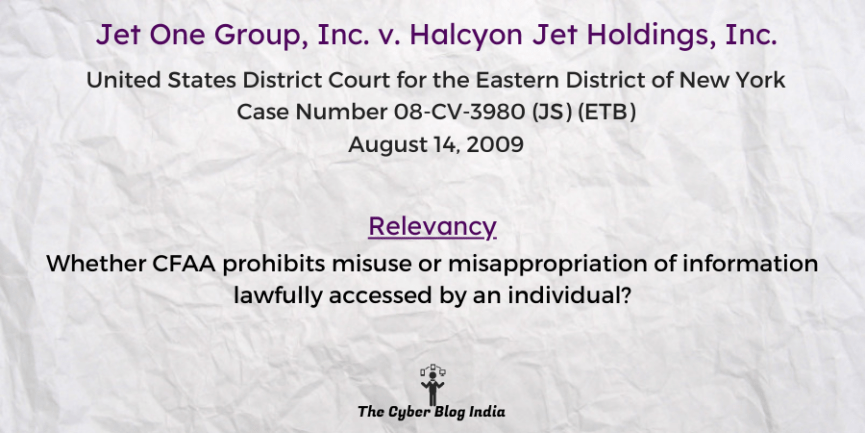Jet One Group, Inc. v. Halcyon Jet Holdings, Inc.

Jet One Group, Inc. v. Halcyon Jet Holdings, Inc.
In the United States District Court for the Eastern District of New York
Case Number 08-CV-3980 (JS) (ETB)
Before District Judge Joanna Seybert
Decided on August 14, 2009
Relevancy of the Case: Whether CFAA prohibits misuse or misappropriation of information lawfully accessed by an individual?
Statutes and Provisions Involved
- The New York General Business Legislation, NY Gen Bus L § 1 (2022)
- The Computer Fraud and Abuse Act, 18 U.S.C. § 1030
- The Federal Rules of Civil Procedure (Rule 12(b)(6), 11(b)(3))
- The Racketeer Influenced and Corrupt Organisations, 18 U.S.C. § 1961
Relevant Facts of the Case
- The plaintiff and defendant companies were in the same business of brokering private jets for clients.
- In 2007, the defendant’s then-CEO, Palagonia, the second defendant in this case, approached the plaintiff company to purchase all or a part of the company. The plaintiff refused this offer because of his alleged criminal background.
- Thereafter, the defendant hired Hader, the third defendant in this case. The defendant paid him $50,000 to leave the plaintiff’s company and provide the defendant company with the plaintiff’s confidential and proprietary information, including computer records.
- The defendant company again approached the plaintiff. This time, it misrepresented to the plaintiff that Palagonia was no longer involved in the company’s management. Subsequently, the plaintiff entered into negotiations with the defendant.
- In this claim, the plaintiff alleges that the defendant never intended to acquire the plaintiff. The defendant company devised this plan to gain access to the plaintiff’s confidential information. Moreover, the defendant did not have sufficient funds to carry out the transaction. It kept recruiting the plaintiff’s brokers to leave their employment with the plaintiff.
- On the other hand, the defendants have moved to dismiss the plaintiff’s claims.
Prominent Arguments by the Counsels
- The plaintiff’s counsel argued that the third defendant had access to the plaintiff’s confidential and proprietary information during the employment. He wrongfully provided this information to the defendant, including computer records. The counsel contended that though he had access to their client list, he exceeded the authorisation by taking it for the defendant’s benefit.
- The defendants’ counsel sought to dismiss the plaintiff’s CFAA claim. The counsel submitted that the plaintiff has failed to allege any CFAA violation. The plaintiff has already acknowledged that the third defendant had access to information in his ordinary course of employment.
Opinion of the Bench
- CFAA prohibits only improper access to computer records. It does not prohibit misuse or misappropriation of information that the third defendant lawfully accessed.
Final Decision
- The court granted the defendants’ motion to dismiss the CFAA claim.
Anjali Agrawal, an undergraduate student at the NALSAR University of Law, prepared this case summary during her internship with The Cyber Blog India in May/June 2022.
